Formatting Response Data¶
By Steve Smith
ASP.NET Core MVC has built-in support for formatting response data, using fixed formats or in response to client specifications.
Sections
View or download sample from GitHub.
Format-Specific Action Results¶
Some action result types are specific to a particular format, such as JsonResult and ContentResult. Actions can return specific results that are always formatted in a particular manner. For example, returning a JsonResult will return JSON-formatted data, regardless of client preferences. Likewise, returning a ContentResult will return plain-text-formatted string data (as will simply returning a string).
Note
An action isn’t required to return any particular type; MVC supports any object return value. If an action returns an IActionResult implementation and the controller inherits from Controller, developers have many helper methods corresponding to many of the choices. Results from actions that return objects that are not IActionResult types will be serialized using the appropriate IOutputFormatter implementation.
To return data in a specific format from a controller that inherits from the Controller base class, use the built-in helper method Json to return JSON and Content for plain text. Your action method should return either the specific result type (for instance, JsonResult) or IActionResult.
Returning JSON-formatted data:
// GET: api/authors
[HttpGet]
public JsonResult Get()
{
return Json(_authorRepository.List());
}
Sample response from this action:
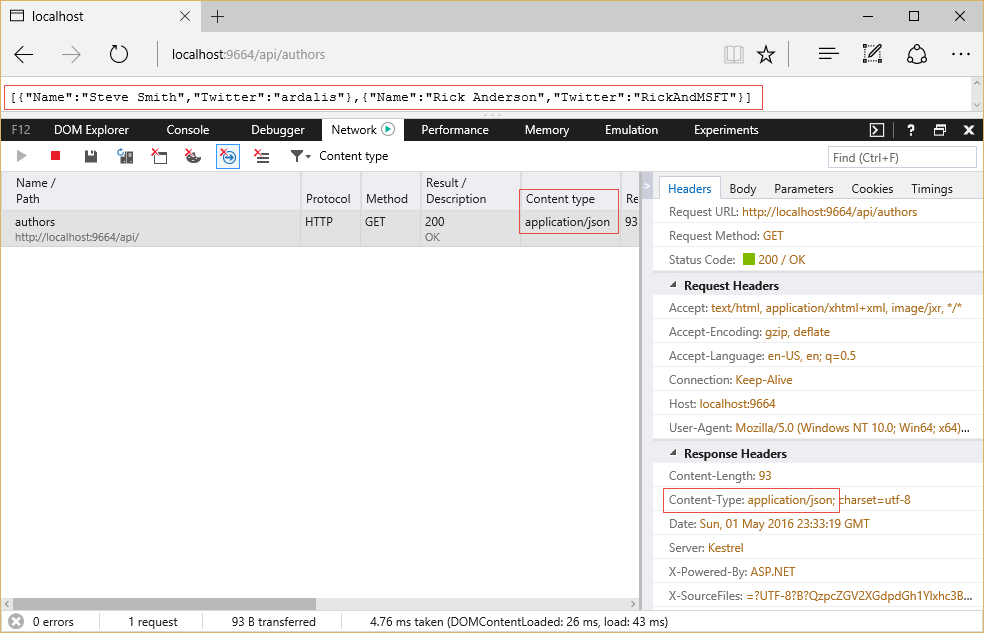
Note that the content type of the response is application/json, shown both in the list of network requests and in the Response Headers section. Also note the list of options presented by the browser (in this case, Microsoft Edge) in the Accept header in the Request Headers section. The current technique is ignoring this header; obeying it is discussed below.
To return plain text formatted data, use ContentResult and the Content helper:
// GET api/authors/about
[HttpGet("About")]
public ContentResult About()
{
return Content("An API listing authors of docs.asp.net.");
}
A response from this action:
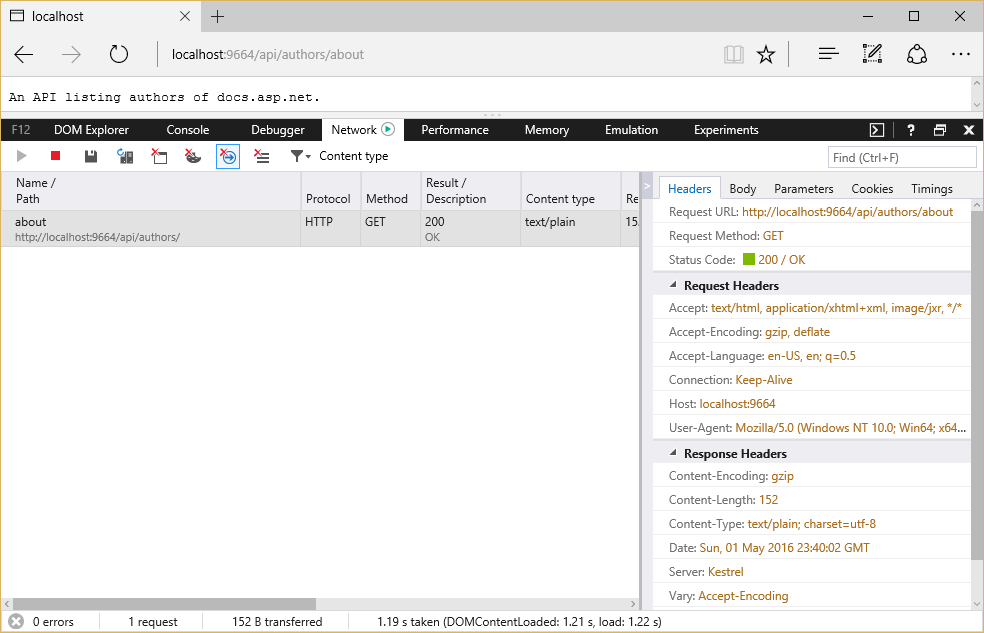
Note in this case the Content-Type returned is text/plain. You can also achieve this same behavior using just a string response type:
// GET api/authors/version
[HttpGet("version")]
public string Version()
{
return "Version 1.0.0";
}
Tip
For non-trivial actions with multiple return types or options (for example, different HTTP status codes based on the result of operations performed), prefer IActionResult as the return type.
Content Negotiation¶
Content negotiation (conneg for short) occurs when the client specifies an Accept header. The default format used by ASP.NET Core MVC is JSON. Content negotiation is implemented by ObjectResult. It is also built into the status code specific action results returned from the helper methods (which are all based on ObjectResult). You can also return a model type (a class you’ve defined as your data transfer type) and the framework will automatically wrap it in an ObjectResult for you.
The following action method uses the Ok and NotFound helper methods:
// GET: api/authors/search?namelike=th
[HttpGet("Search")]
public IActionResult Search(string namelike)
{
var result = _authorRepository.GetByNameSubstring(namelike);
if (!result.Any())
{
return NotFound(namelike);
}
return Ok(result);
}
A JSON-formatted response will be returned unless another format was requested and the server can return the requested format. You can use a tool like Fiddler to create a request that includes an Accept header and specify another format. In that case, if the server has a formatter that can produce a response in the requested format, the result will be returned in the client-preferred format.
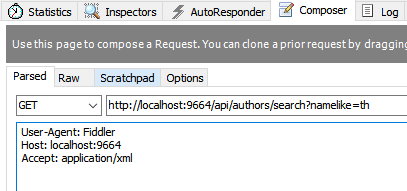
In the above screenshot, the Fiddler Composer has been used to generate a request, specifying Accept: application/xml. By default, ASP.NET Core MVC only supports JSON, so even when another format is specified, the result returned is still JSON-formatted. You’ll see how to add additional formatters in the next section.
Controller actions can return POCOs (Plain Old CLR Objects), in which case ASP.NET MVC will automatically create an ObjectResult for you that wraps the object. The client will get the formatted serialized object (JSON format is the default; you can configure XML or other formats). If the object being returned is null, then the framework will return a 204 No Content response.
Returning an object type:
// GET api/authors/ardalis
[HttpGet("{alias}")]
public Author Get(string alias)
{
return _authorRepository.GetByAlias(alias);
}
In the sample, a request for a valid author alias will receive a 200 OK response with the author’s data. A request for an invalid alias will receive a 204 No Content response. Screenshots showing the response in XML and JSON formats are shown below.
Content Negotiation Process¶
Content negotiation only takes place if an Accept header appears in the request. When a request contains an accept header, the framework will enumerate the media types in the accept header in preference order and will try to find a formatter that can produce a response in one of the formats specified by the accept header. In case no formatter is found that can satisfy the client’s request, the framework will try to find the first formatter that can produce a response (unless the developer has configured the option on MvcOptions to return 406 Not Acceptable instead). If the request specifies XML, but the XML formatter has not been configured, then the JSON formatter will be used. More generally, if no formatter is configured that can provide the requested format, then the first formatter than can format the object is used. If no header is given, the first formatter that can handle the object to be returned will be used to serialize the response. In this case, there isn’t any negotiation taking place - the server is determining what format it will use.
Note
If the Accept header contains /, the Header will be ignored unless RespectBrowserAcceptHeader is set to true on MvcOptions.
Browsers and Content Negotiation¶
Unlike typical API clients, web browsers tend to supply Accept headers that include a wide array of formats, including wildcards. By default, when the framework detects that the request is coming from a browser, it will ignore the Accept header and instead return the content in the application’s configured default format (JSON unless otherwise configured). This provides a more consistent experience when using different browsers to consume APIs.
If you would prefer your application honor browser accept headers, you can configure this as part of MVC’s configuration by setting RespectBrowserAcceptHeader to true in the ConfigureServices method in Startup.cs.
services.AddMvc(options =>
{
options.RespectBrowserAcceptHeader = true; // false by default
}
Configuring Formatters¶
If your application needs to support additional formats beyond the default of JSON, you can add these as additional dependencies in project.json and configure MVC to support them. There are separate formatters for input and output. Input formatters are used by Model Binding; output formatters are used to format responses. You can also configure 🔧 Custom Formatters.
Adding XML Format Support¶
To add support for XML formatting, add the “Microsoft.AspNetCore.Mvc.Formatters.Xml” package to your project.json‘s list of dependencies.
Add the XmlSerializerFormatters to MVC’s configuration in Startup.cs:
public void ConfigureServices(IServiceCollection services)
{
services.AddMvc()
.AddXmlSerializerFormatters();
services.AddScoped<IAuthorRepository, AuthorRepository>();
}
Alternately, you can add just the output formatter:
services.AddMvc(options =>
{
options.OutputFormatters.Add(new XmlSerializerOutputFormatter());
});
These two approaches will serialize results using System.Xml.Serialization.XmlSerializer. If you prefer, you can use the System.Runtime.Serialization.DataContractSerializer by adding its associated formatter:
services.AddMvc(options =>
{
options.OutputFormatters.Add(new XmlDataContractSerializerOutputFormatter());
});
Once you’ve added support for XML formatting, your controller methods should return the appropriate format based on the request’s Accept header, as this Fiddler example demonstrates:
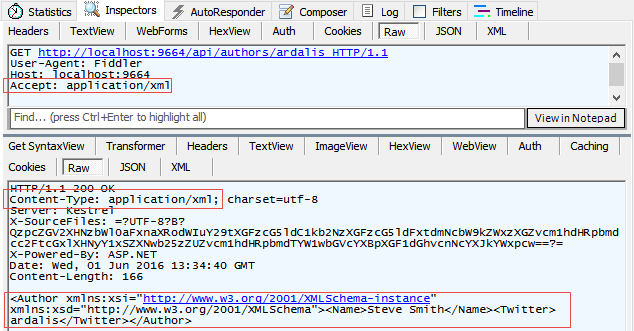
You can see in the Inspectors tab that the Raw GET request was made with an Accept: application/xml header set. The response pane shows the Content-Type: application/xml header, and the Author object has been serialized to XML.
Use the Composer tab to modify the request to specify application/json in the Accept header. Execute the request, and the response will be formatted as JSON:
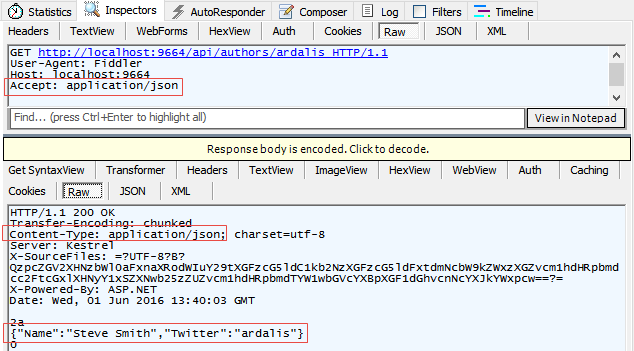
In this screenshot, you can see the request sets a header of Accept: application/json and the response specifies the same as its Content-Type. The Author object is shown in the body of the response, in JSON format.
Forcing a Particular Format¶
If you would like to restrict the response formats for a specific action you can, you can apply the [Produces] filter. The [Produces] filter specifies the response formats for a specific action (or controller). Like most Filters, this can be applied at the action, controller, or global scope.
[Produces("application/json")]
public class AuthorsController
The [Produces] filter will force all actions within the AuthorsController to return JSON-formatted responses, even if other formatters were configured for the application and the client provided an Accept header requesting a different, available format. See Filters to learn more, including how to apply filters globally.
Special Case Formatters¶
Some special cases are implemented using built-in formatters. By default, string return types will be formatted as text/plain (text/html if requested via Accept header). This behavior can be removed by removing the TextOutputFormatter. You remove formatters in the Configure method in Startup.cs (shown below). Actions that have a model object return type will return a 204 No Content response when returning null. This behavior can be removed by removing the HttpNoContentOutputFormatter. The following code removes the TextOutputFormatter and HttpNoContentOutputFormatter`.
services.AddMvc(options =>
{
options.OutputFormatters.RemoveType<TextOutputFormatter>();
options.OutputFormatters.RemoveType<HttpNoContentOutputFormatter>();
});
Without the TextOutputFormatter, string return types return 406 Not Acceptable, for example. Note that if an XML formatter exists, it will format string return types if the TextOutputFormatter is removed.
Without the HttpNoContentOutputFormatter, null objects are formatted using the configured formatter. For example, the JSON formatter will simply return a response with a body of null, while the XML formatter will return an empty XML element with the attribute xsi:nil="true" set.
Response Format URL Mappings¶
Clients can request a particular format as part of the URL, such as in the query string or part of the path, or by using a format-specific file extension such as .xml or .json. The mapping from request path should be specified in the route the API is using. For example:
[FormatFilter]
public class ProductsController
{
[Route("[controller]/[action]/{id}.{format?}")]
public Product GetById(int id)
This route would allow the requested format to be specified as an optional file extension. The [FormatFilter] attribute checks for the existence of the format value in the RouteData and will map the response format to the appropriate formatter when the response is created.
| Route | Formatter |
|---|---|
/products/GetById/5 |
The default output formatter |
/products/GetById/5.json |
The JSON formatter (if configured) |
/products/GetById/5.xml |
The XML formatter (if configured) |